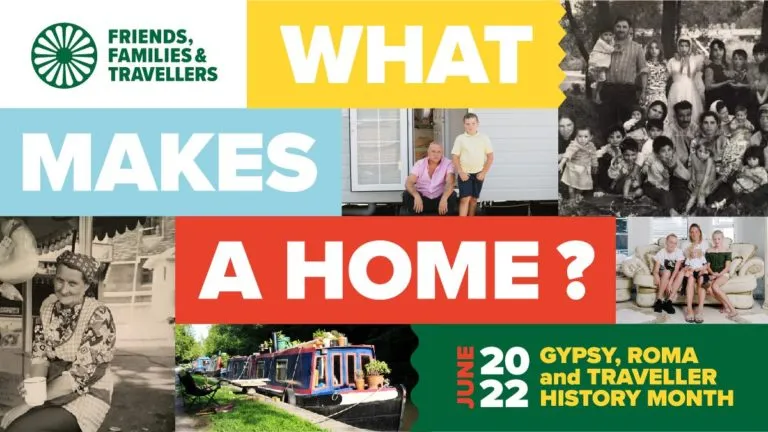What makes a home
Published: by Guest blog

Guest blog by Abiline McShane, Chris McDonagh, Mattey Mitchell
Last month was Gypsy, Roma and Traveller History Month (GRTHM). This event has been celebrated every year since 2008. With celebration, education and efforts to raise awareness of the histories and experiences of Gypsy, Roma and Traveller people, GRTHM helps to tackle prejudice, challenge myths, and amplify the voices of Gypsy, Roma and Traveller people.
Home is right at the centre of the Gypsy, Roma and Traveller histories and cultures. For this year’s GRTHM, Friends, Families and Travellers chose ‘What makes a home’ as the theme. This guest blog, produced during GRTHM, features testimonies from three people of Romany Gypsy and Irish Traveller backgrounds on what home means to them.
What makes a home?
What ‘home’ means is different for everyone. That’s no less true for Gypsy or Traveller people. Yet stereotypes of how these communities live are widespread and are a big part of the discrimination and inequalities the communities face.
By sharing real stories of what home means to us, we can help bridge divides and begin to tackle injustices.
Chris McDonagh, Irish Traveller: ‘A home isn’t just a roof over your head. A home is who is around you. A home is a place you feel at peace. A home is a place you know in your soul that you belong.
‘A home is all of these things, but most importantly a home is a home.’
Mattey Mitchell, Romany: ‘I think most people have a set image of what “a home” is, and the interesting thing is that it’s rarely just four walls. There’s always something else; home is where your family is. Home is where you feel safe. “Home” could be a town, a county, or even a whole country. I think most people think of Romany and Traveller people as being “at home” in trailers – it’s like our trademark.
‘What’s comical is that for us, like for you, home is not just a physical space. Home is the place you think of when you’re down, the place you want to go back to when times are hard. “Home” is where you feel most like yourself.’
Abiline McShane, Romany Gypsy: ‘Home to me, is living on a site – this is what a normal day is like.
‘You wake up in the morning to the sound of the men getting ready for work. The children go off to school, except the teenagers. The teenage boys go to work with their dads; the teenage girls stay home to help mum with the elderly and the younger children. When everyone is out, you change the beds – the bunks go back to sofas, the dining table stops being a bed. You stop to pay the rent, get the electricity on the meter; you pay the gasman, who comes with the gas bottles. We clean from top to bottom. The women and older girls are cleaning the roofs, the walls, outside of the pitch and the shed (the dayroom). The younger girls are playing with the babies. Everyone stops for lunch.’
Home at risk
But while we celebrate GRTHM and ‘home’, rights and access to safe, suitable housing for the communities are under constant threat.
From the undersupply of suitable traveller sites and a lack of genuinely affordable bricks and mortar housing, to the Police, Crime, Sentencing and Courts Act; Gypsy, Roma and Traveller people today are being forced into bad, often dangerous housing circumstances.
Chris: ‘Many people are left with nowhere to go, with little to no choice, and this often applies to Traveller and Romany people too. The sites and land we grew up on are sold off to the highest bidder and we are then left with nowhere else to stay.
‘We are forced to wander the roads and stay in car parks and fields simply because we haven’t got anywhere else to go. Our sites are a massive part of our communities.’
Abiline: ‘The site is full. There are no more spaces. The site is overcrowded. To get a pitch, you have to wait for neighbours to die. In some cities, there are no permanent sites, no transit sites and they don’t do negotiated stopping.
‘There are no laws for local authorities to build sites, but there is government funding available to them – often they don’t use it.
‘The local councillor stirs up racism in the community when an unauthorised encampment comes to town. Families with nowhere to go, families with poor mental health. Our families have the highest rates of suicide, the highest rate of infant mortality, poor access to GPs, and barriers to education and work.’
Acting on inequalities
**‘**I think the funniest thing is that there’s so much division about what we live in when, in reality, “home” is the one thing we have most in common.’
Mattey Mitchell
GRTHM is a time to celebrate. We celebrate culture and history by telling stories – stories like these about what makes a home. But as we celebrate, we cannot avoid reflecting on the huge inequalities communities often face, just because of their identities and history.
As we move beyond GRTHM, we must recognise the need to think and act on the inequalities the communities face all year round. If you want regular campaigning updates and to get more involved, you can sign up with Friends, Families and Travellers.